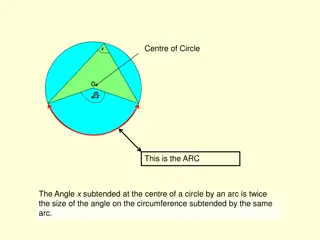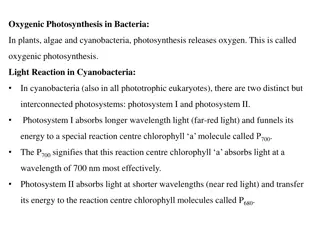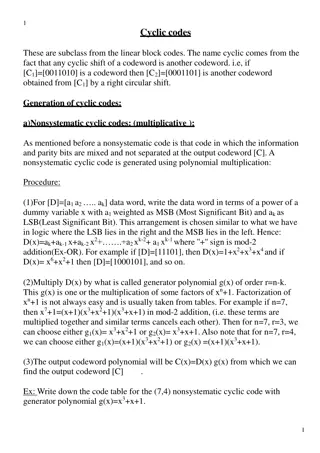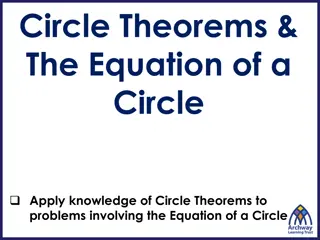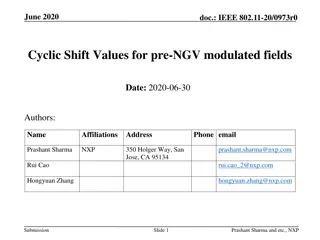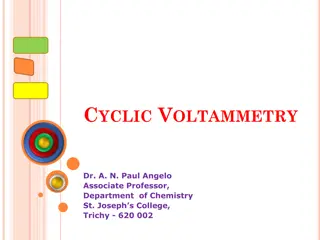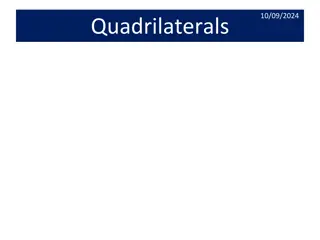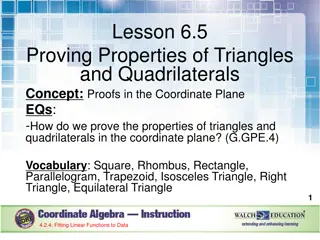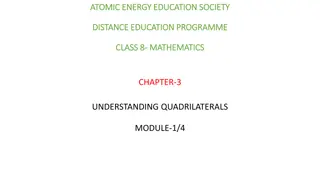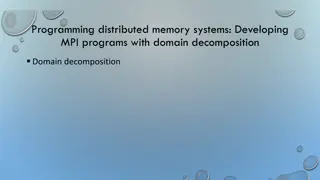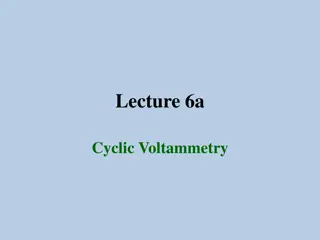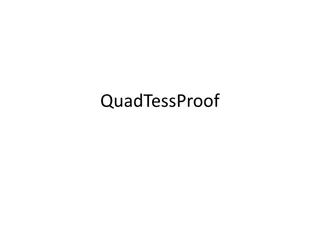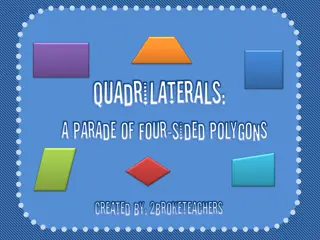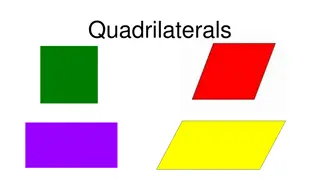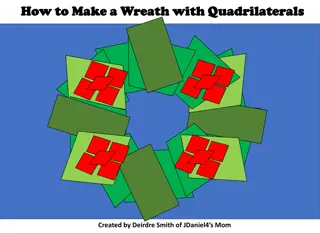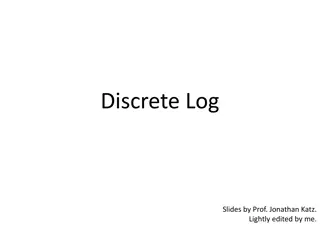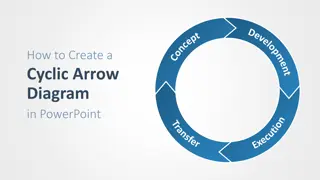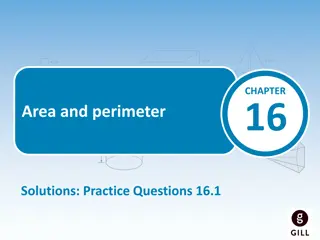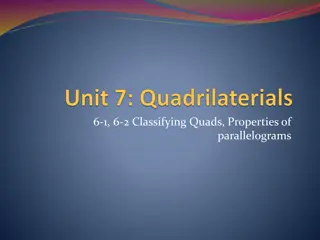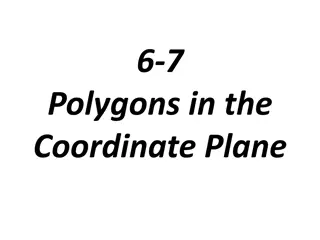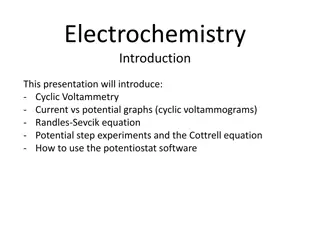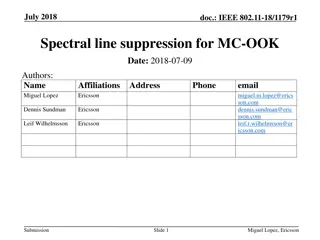Circle Geometry Principles
Explore key concepts in circle geometry such as angles subtended at the center and circumference, cyclic quadrilaterals, properties of tangents and chords, and the significance of major and minor segments. Uncover relationships between angles, segments, and points on a circle, including alternate se
3 views • 8 slides
Quadrilaterals and Triangles on a Grid
Dive into a fun investigation where you draw different quadrilaterals on a 3x3 dot grid to find all possibilities. Challenge yourself further by creating triangles on the same grid and compare the level of difficulty with quadrilaterals. Visual aids and answers provided for guidance.
1 views • 6 slides
Photosynthesis in Bacteria and Cyanobacteria
Oxygenic photosynthesis in plants, algae, and cyanobacteria releases oxygen. Cyanobacteria utilize photosystems I and II in their light reactions, with distinct roles in light absorption and electron transfer. Cyclic photophosphorylation involves only photosystem I, while non-cyclic photophosphoryla
1 views • 10 slides
Cyclic Codes: Generation and Examples
Cyclic codes are a subclass of linear block codes where any cyclic shift of a codeword results in another valid codeword. This article explains the generation of nonsystematic cyclic codes through polynomial multiplication and provides examples and code tables for both nonsystematic and systematic c
1 views • 11 slides
Circle Theorems and Equations of Circles
Explore circle theorems and equations of circles in geometry, including concepts like opposite angles in cyclic quadrilaterals, angles on a straight line, and important theorems like the perpendicular bisector of a chord passing through the center of a circle. Learn how to apply these theorems to fi
1 views • 12 slides
Photophosphorylation and Oxidative Phosphorylation in Biochemistry
Phosphorylation is the process of ATP production from ADP, occurring in two main forms - Photophosphorylation and Oxidative Phosphorylation. Photophosphorylation involves utilizing light energy to convert ADP to ATP, with two types: Cyclic and Non-Cyclic. Oxidative Phosphorylation uses energy from t
1 views • 15 slides
IEEE 802.11-20/0973r0 Cyclic Shift Values for Pre-NGV Modulated Fields
Introduction to the determination of cyclic shift values for pre-NGV modulated fields in the IEEE 802.11-20/0973r0 document. The proposal suggests using existing values defined for pre-VHT, specifically for L-STF, L-LTF, L-SIG, and VHT-SIG-A fields of the PPDU. References and a straw poll are also i
2 views • 5 slides
Cyclic Voltammetry in Electrochemical Analysis
Cyclic voltammetry is a crucial electroanalytical technique for studying electrochemical behavior. It involves sweeping potential in a cyclic manner to measure current responses, aiding in understanding redox processes, electron transfer kinetics, and coupled reactions. The technique requires carefu
1 views • 10 slides
Quadrilaterals and Symmetry Concepts
Delve into the world of quadrilaterals by identifying their properties, understanding rotational symmetry, and tackling questions on angles and shapes. Engage in activities to enhance your knowledge and skills in geometry.
1 views • 28 slides
2D Shapes and Polygons
Uncover the world of 2D shapes and polygons with a brain dump session, identifying common shapes like triangles, quadrilaterals, and polygons with Greek and Latin numerical prefixes. Learn the distinguishing features of shapes, symbols used to represent key characteristics, and how markings denote e
1 views • 27 slides
Shapes and Attributes in 3rd Grade Mathematics
Delve into reasoning with shapes and their attributes for 3rd-grade students using engaging tools and activities. This educational material covers composing and decomposing triangles and quadrilaterals, identifying and drawing various types of quadrilaterals, and fostering critical thinking skills t
1 views • 24 slides
Proofs in Coordinate Plane: Triangles & Quadrilaterals
Explore how to prove the properties of triangles and quadrilaterals utilizing coordinates, slopes, and distances in the coordinate plane. Learn about different types of triangles and quadrilaterals, key concepts like parallel and perpendicular lines, and the distance formula to establish geometric t
1 views • 34 slides
Quadrilaterals in Mathematics Education
This educational content delves into the understanding of quadrilaterals in mathematics, covering topics such as polygons, convex and concave shapes, regularity, diagonals, and angle properties. Through detailed explanations and visual aids, viewers can grasp the fundamental concepts and properties
1 views • 20 slides
Developing MPI Programs with Domain Decomposition
Domain decomposition is a parallelization method used for developing MPI programs by partitioning the domain into portions and assigning them to different processes. Three common ways of partitioning are block, cyclic, and block-cyclic, each with its own communication requirements. Considerations fo
1 views • 19 slides
Overview of Draft Risk Evaluation for Cyclic Aliphatic Bromide Cluster (HBCD)
The overview discusses the draft risk evaluation of the Cyclic Aliphatic Bromide Cluster (HBCD) conducted by Eva M. Wong, Ph.D., from the Office of Pollution Prevention and Toxics, U.S. Environmental Protection Agency. It covers sections on exposure, hazards, risk characterization, risk determinatio
0 views • 13 slides
Cyclic Voltammetry in Electrochemical Methods
Electrochemical methods, such as cyclic voltammetry, are crucial for studying electron transfer processes, redox reactions, and adsorption on surfaces. Cyclic voltammetry involves varying the applied potential at a working electrode to monitor electron flow and chemical reactions. Peaks in the curre
0 views • 11 slides
Picture Proof: Quadrilaterals Tessellate through Angle Sum Property
Exploring the concept of tessellation with quadrilaterals by splitting them into triangles based on the angle sum property. The collection of images provides visual proofs demonstrating how all quadrilaterals tessellate effectively.
2 views • 13 slides
Quadrilaterals: Types and Properties
Learn about various types of quadrilaterals including squares, rectangles, rhombuses, and trapezoids. Understand their unique characteristics such as sides, angles, and parallel lines. Dive into the world of polygons and enhance your geometric knowledge.
0 views • 10 slides
Quadrilaterals: Shapes and Definitions
Discover the common characteristics of quadrilaterals, the meanings of "quad" and "lateral," and definitions of various shapes like squares, rectangles, rhombuses, and parallelograms through engaging visual comparisons and descriptions.
0 views • 10 slides
Properties of Shapes: Triangles and Quadrilaterals
Delve into the properties of shapes like triangles and quadrilaterals to uncover missing angles, identify types of triangles, and compare various quadrilateral shapes. Enhance your understanding of angles, opposite angles, and angles within shapes to solve geometric puzzles and problems effectively.
0 views • 37 slides
Constructing Unique Quadrilaterals using Given Parameters
Learn how to construct a quadrilateral when given specific parameters like sides, diagonals, angles, and special properties. Follow step-by-step instructions to create unique quadrilaterals such as PQRS or ABCD using geometric criteria and arc constructions.
0 views • 27 slides
Create a Quadrilateral Wreath with Deirdre Smith's Step-by-Step Guide
Learn how to make a beautiful wreath using quadrilaterals with the guidance of Deirdre Smith's detailed instructions. The set includes a planning page and printable shapes to help children create their own unique wreath. Explore different types of quadrilaterals and follow the algorithm to draw trap
0 views • 10 slides
Quadrilaterals: 3rd Grade Performance Event in Mathematics
This PowerPoint presentation features a 3rd-grade performance event item where students sort quadrilaterals and describe their attributes. The presentation includes student work samples with scoring guides for 3, 2, and 1 points. Students are assessed based on their ability to accurately sort quadri
0 views • 10 slides
Managing Cyclic Esotropia in a 6-Year-Old Child: A Case Report
A rare case of cyclic esotropia in a 6-year-old child is presented, highlighting the diagnosis, management, and successful outcome post bilateral medial rectus recession surgery. Primary cyclic esotropia, common in hyperopic children, was effectively treated with horizontal muscle surgery, leading t
0 views • 6 slides
Petroleum Hydrocarbons and Their Properties
Petroleum is a complex mixture of hydrocarbons, including paraffins, olefins, naphthenes, and aromatics. Paraffins are fully saturated and stable, olefins are unsaturated with double bonds, naphthenes are cyclic saturated hydrocarbons, and aromatics are cyclic unsaturated hydrocarbons containing ben
1 views • 19 slides
Overview of Different Types of Nucleic Acids in Viruses
Explore the diverse types of nucleic acids found in viruses, including ssDNA, dsDNA, ssRNA, dsRNA, single-stranded cyclic DNA, double-stranded cyclic DNA, single-stranded cyclic RNA, and double-stranded cyclic RNA. The provided images depict the various classifications, shedding light on the genetic
0 views • 10 slides
Cyclic Groups and Discrete Logarithms
Exploring the concepts of cyclic groups and discrete logarithms in group theory. This presentation covers the definition of generators, examples of cyclic groups, important theorems related to prime orders and cyclic groups, uniform sampling in cyclic groups, and the discrete logarithm problem. Exam
1 views • 14 slides
Implementation of Cyclic Executive in Real-Time Systems
Exploring the implementation of a cyclic executive in real-time systems through task specifications, scheduler design, and program code examples. This approach involves executing tasks in a predictable sequence within fixed time slots to achieve precise timing requirements.
0 views • 10 slides
Creating a Cyclic Arrow Diagram in PowerPoint
Learn how to design a visually engaging cyclic arrow diagram in PowerPoint by following a step-by-step tutorial. Start by adding shapes, duplicating, merging, and styling elements to create a professional and dynamic visualization of concepts or processes. Enhance your presentation skills with this
0 views • 13 slides
Area and Perimeter Practice Questions: Quadrilaterals and Triangles
Various practice questions related to finding the area of quadrilaterals like rectangles, squares, parallelograms, and trapeziums, as well as triangles. Improve your skills in calculating areas with different shapes and dimensions.
0 views • 50 slides
Classifying Quadrilaterals in Geometry
Learn about different types of quadrilaterals like rectangles, parallelograms, rhombuses, squares, trapezoids, and kites. Discover their unique characteristics and how to classify them based on properties like sides, angles, and parallel lines. Dive into examples to understand how to determine preci
0 views • 10 slides
Classifying Quadrilaterals and Parallelogram Properties
Classification of quadrilaterals and delve into the properties of parallelograms. Understand definitions of parallelogram, rhombus, rectangle, square, and kite. Learn to identify special quadrilaterals and apply relationships among sides, angles, and diagonals in problem-solving scenarios.
0 views • 24 slides
Sequencing Cyclic Peptides by Shayan Abtahi
Non-ribosomal peptides are challenging to sequence due to the need for mass spectrometry and the complexity of cyclic peptides. An algorithm comparing theoretical and experimental spectra can help, but may be slow on older devices as seen in a case studying tyrocidine B1.
0 views • 5 slides
Polygons in the Coordinate Plane: Classifying Triangles, Parallelograms, and Quadrilaterals
In this educational content, various problems related to classifying polygons in the coordinate plane are explored. Students will learn to identify and categorize triangles, parallelograms, and quadrilaterals based on their properties and coordinates. The visual aids provided help in visualizing the
0 views • 7 slides
Topic : Understanding Quadrilaterals
In day-to-day life, we encounter various objects shaped like quadrilaterals. This chapter explores different types of quadrilaterals, their properties, and the derivation of angle sum property for polygons. From defining plane curves to understanding the properties of trapezium and parallelogram, th
0 views • 59 slides
Understanding Cyclic Voltammetry and Current vs. Potential Graphs in Electrochemistry
Learn about cyclic voltammetry, Randles-Sevcik equation, current vs. potential graphs, and how to use potentiostat software for electrochemical analysis. Explore the principles behind electrochemical techniques and their applications in studying redox processes.
0 views • 8 slides
Spectral Line Suppression for MC-OOK in IEEE 802.11-18
Explore methods to suppress spectral lines in MC-OOK signals to improve transmission quality and compliance with FCC limits. The presentation discusses techniques such as cyclic shift randomization and their impact on power distribution. Simulation data and examples of cyclic shifts are included to
0 views • 14 slides
Understanding Cyclic Voltammetry: Electrochemical Analysis Method
Cyclic voltammetry is an electroanalytical technique used to study the electrochemical behavior of a system by sweeping the potential in a cyclic manner and measuring the resulting current response. This method provides insights into redox processes, electron transfer kinetics, and coupled reactions
1 views • 10 slides
Understanding Cyclic and Reversible Processes in Thermodynamics
Learn about cyclic and reversible processes in thermodynamics, including definitions, examples, and comparisons between reversible and irreversible processes. Explore how a system follows a cyclic path and the conditions for a process to be reversible. Understand the concept with a practical example
0 views • 5 slides
Understanding First Order Logic with Fixed-Points and Cyclic Proofs
Dive into the realm of First Order Logic with Fixed-Points, exploring proof systems, inference rules, and the concept of cyclic proofs. Learn how this formal language allows precise statements and theories, along with the fascinating world of fixed-points and their significance in logic.
0 views • 30 slides
